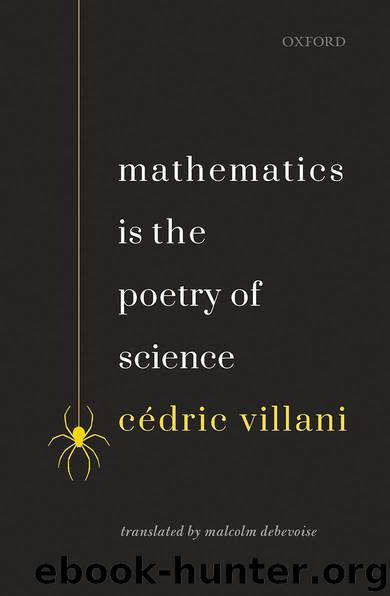Mathematics is the Poetry of Science by Cedric Villani

Author:Cedric Villani [Villani, Cedric]
Language: eng
Format: epub
ISBN: 9780192585462
Publisher: OUP Oxford
Published: 2020-03-05T00:00:00+00:00
appendix
Henri Poincaré on Mathematical Discovery
The genesis of mathematical discovery is a problem which must inspire the psychologist with the keenest interest. For this is the process in which the human mind seems to borrow least from the exterior world, in which it acts, or appears to act, only by itself and on itself, so that by studying the process of geometric thought we may hope to arrive at what is most essential in the human mind.
This has long been understood, and a few months ago a review called l’Enseignement Mathématique, edited by MM. Laisant and Fehr, instituted an enquiry into the habits of mind and methods of work of different mathematicians. I had outlined the principal features of this article when the results of the enquiry were published, so that I have hardly been able to make any use of them, and I will content myself with saying that the majority of the evidence confirms my conclusions. I do not say there is unanimity, for on an appeal to universal suffrage we cannot hope to obtain unanimity.
One first fact must astonish us, or rather would astonish us if we were not too much accustomed to it. How does it happen that there are people who do not understand mathematics? If the science invokes only the rules of logic, those accepted by all well-formed minds, if its evidence is founded on principles that are common to all men, and that none but a madman would attempt to deny, how does it happen that there are so many people who are entirely impervious to it?
There is nothing mysterious in the fact that every one is not capable of discovery. That every one should not be able to retain a demonstration he has once learnt is still comprehensible. But what does seem most surprising, when we consider it, is that any one should be unable to understand a mathematical argument at the very moment it is stated to him. And yet those who can only follow the argument with difficulty are in a majority; this is incontestable, and the experience of teachers of secondary education will certainly not contradict me.
And still further, how is error possible in mathematics? A healthy intellect should not be guilty of any error in logic, and yet there are very keen minds which will not make a false step in a short argument such as those we have to make in the ordinary actions of life, which yet are incapable of following or repeating without error the demonstrations of mathematics which are longer, but which are, after all, only accumulations of short arguments exactly analogous to those they make so easily. Is it necessary to add that mathematicians themselves are not infallible?
The answer appears to me obvious. Imagine a long series of syllogisms in which the conclusions of those that precede form the premises of those that follow. We shall be capable of grasping each of the syllogisms, and it is not in the passage from premises to conclusion that we are in danger of going astray.
Download
This site does not store any files on its server. We only index and link to content provided by other sites. Please contact the content providers to delete copyright contents if any and email us, we'll remove relevant links or contents immediately.
| Applied | Geometry & Topology |
| History | Infinity |
| Mathematical Analysis | Matrices |
| Number Systems | Popular & Elementary |
| Pure Mathematics | Reference |
| Research | Study & Teaching |
| Transformations | Trigonometry |
Modelling of Convective Heat and Mass Transfer in Rotating Flows by Igor V. Shevchuk(6440)
Weapons of Math Destruction by Cathy O'Neil(6281)
Factfulness: Ten Reasons We're Wrong About the World – and Why Things Are Better Than You Think by Hans Rosling(4742)
A Mind For Numbers: How to Excel at Math and Science (Even If You Flunked Algebra) by Barbara Oakley(3308)
Descartes' Error by Antonio Damasio(3279)
Factfulness_Ten Reasons We're Wrong About the World_and Why Things Are Better Than You Think by Hans Rosling(3240)
TCP IP by Todd Lammle(3185)
Fooled by Randomness: The Hidden Role of Chance in Life and in the Markets by Nassim Nicholas Taleb(3124)
The Tyranny of Metrics by Jerry Z. Muller(3073)
Applied Predictive Modeling by Max Kuhn & Kjell Johnson(3071)
The Book of Numbers by Peter Bentley(2968)
The Great Unknown by Marcus du Sautoy(2695)
Once Upon an Algorithm by Martin Erwig(2650)
Easy Algebra Step-by-Step by Sandra Luna McCune(2636)
Lady Luck by Kristen Ashley(2583)
Police Exams Prep 2018-2019 by Kaplan Test Prep(2549)
Practical Guide To Principal Component Methods in R (Multivariate Analysis Book 2) by Alboukadel Kassambara(2545)
All Things Reconsidered by Bill Thompson III(2394)
Linear Time-Invariant Systems, Behaviors and Modules by Ulrich Oberst & Martin Scheicher & Ingrid Scheicher(2371)
